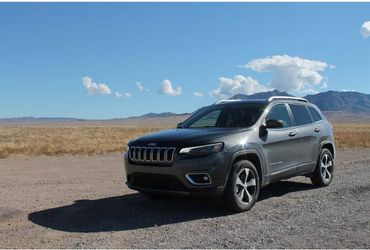
Jeeps are not known for providing a smooth driving experience, as they are more for off-roading than city streets. You can still expect some smoothness. For example, people often ask, “Do Jeeps have bad transmissions?”
But unfortunately, the 2014 Jeep Cherokee, in particular, has transmission issues that can be costly to fix. And can also affect the vehicle’s safety.
These issues include difficulty shifting, poor performance, and jerking and hesitation. These problems are often linked to the vehicle’s 9-speed automatic gearbox. It’s known as the ZF 9HP transmission, which causes reliability issues.
Take steps to prevent Jeep Cherokee transmission problems by knowing the most common transmission problems.
Let’s explore this article.
What Are The Most Common Jeep Cherokee Transmission Problems?
2014 and 2015 Jeep Cherokees are the most prone to transmission problems. Here, we’ll talk specifically about some of the most typical Jeep Cherokee transmission issues.
Some problems include:
- Difficulty shifting gears
- Unexpected transmission failure
- Loss of power while driving: This can be a safety hazard
- Transmission shifting into neutral
- Delayed shifting during acceleration.
These transmission issues can be an inconvenience and even a potential safety risk for the driver. Read further to know the explained Jeep Cherokee transmission problems.
Difficulty Shifting Gears
The most frequent Jeep Cherokee transmission problem is rough shifting, particularly from a stop to 3rd gear. This issue, which is similar to delayed acceleration, occurs during the first three gears. & is typically noticed when driving at speeds under 25 mph.
Hard shifting is not only unpredictable but also causes concern for drivers, as it can feel like the vehicle has been hit from behind. Jeep owners have reported jerking, lunging forward, shuttering, and vibration before shifting. And the Jeep not shifting at the appropriate time, either reaching high RPMs or very low RPMs before shifting.
Some handling behaviors that may indicate Jeep Cherokee transmission problems include:
- Jerking or lurching while shifting gears
- Inconsistent or unpredictable shifting patterns
- Rough or forceful shifting into gear
- Stalling or bucking while driving
- Suddenly turns to the left at busy intersections
- The accelerator pedal isn’t responding
- Hard thrusts into 1st and 2nd gears at fast stops.
According to owners, manual shifting does not resolve the transmission problems with the 2014 and 2015 Jeep Cherokee models. Jeep extended the transmission warranty to 100,000 miles. But many owners report difficulty getting the transmission repaired under the warranty.
Unexpected Transmission Failure
Unexpected transmission failure in a Jeep Cherokee would refer to the transmission ceasing to function without any warning signs or prior signs of a problem. This can happen while the vehicle is in motion or trying to shift gears. This can leave the driver stranded and unable to move the vehicle, which can be a dangerous situation if it occurs while driving.
The software in the Jeep Cherokee may not alert the driver of any transmission issues until it completely breaks down. While Jeep has released a software update to address this, its effectiveness is uncertain.
Many owners have reported that their transmissions failed at around 50,000 to 70,000 miles. Although they were able to replace it under warranty. The repair process takes several weeks, and they worry that it might fail again once the warranty expires.
Loss of power while driving
Power loss while driving in a Jeep Cherokee refers to the vehicle losing power while in motion. It can happen as a result of a transmission issue. When shifting gears or while the car is moving, this can happen.
It can be dangerous if it occurs when driving at high speeds or merging onto a highway.
Some Cherokee owners experience this problem within a week of buying a new unit. Others might not discover it till much later. But can still experience transmission failure three times under 40,000 miles.
Some symptoms of power loss while driving include difficulty accelerating, the vehicle slowing down unexpectedly, the engine RPMs dropping or surging, and the transmission slipping or not engaging.
These signs could point to an issue with the transmission or other powertrain parts of the car.
Transmission Shifting Into Neutral
The transmission’s potential to shift into neutral is one of the Jeep Cherokee’s worst problems.
This may happen for a number of reasons, including transmission mechanical or electrical problems. Or, problems with the transmission fluid or filter.
This can be a hazardous circumstance, especially if it occurs on the highway. Despite Jeep issuing recalls and software updates, it’s uncertain if the problem is solvable.
Some owners have reported the issue even with their vehicle having a mileage of 70,000 miles.
Delayed Shifting During Acceleration
Delayed shifting while accelerating in a Jeep can happen for several different factors. Some common causes include:
- Low transmission fluid levels: If the transmission is low on fluid, it may not be able to shift gears.
- Clogged transmission filter: A clogged filter can restrict the flow of transmission fluid, causing delays in shifting.
- Worn or damaged transmission components: The gears, bearings, and other components in the transmission can wear out or become damaged. & causes shifting problems.
- Electrical issues: If there is an issue with the transmission control module or other electrical components, it can cause delays in shifting.
- Software issues: In some cases, a software update or a problem with the transmission control module’s programming can cause shifting delays.
It’s important to note that delayed shifting while accelerating can also be a symptom of other issues in the vehicle. Such as engine or transmission mount failure or problems with the driveline.
Jeep owners of vehicles affected by shifting issues often try to fix the problem by getting software updates or replacing the transmission. It is unlikely that these measures will completely solve the issue for many customers. As many continue to experience problems with shifting gears. Even after attempting these solutions.
Bad Engines And Transmissions Problem In Jeeps & How To Fix It!
Bad engine and transmission problems in a Jeep can occur due to a variety of reasons, some of the common causes are:
- Lack of regular maintenance: Neglecting regular maintenance such as oil changes, transmission fluid flushes, and filter replacements can cause problems to arise with the engine and transmission over time.
- Overheating: The engine and transmission can overheat due to clogged coolers, low coolant levels, or faulty cooling systems. & causes damage to the components.
- Mechanical wear and tear: As vehicle ages, the gears, bearings, and other mechanical components in the engine and transmission can wear out. & can cause problems with shifting and power.
- Electrical problems: Issues with the vehicle’s electrical system can cause problems with the engine and transmission. For instance, a malfunctioning sensor or an issue with the computer that manages the transmission.
- Software issues: In some cases, problems with the software that controls the engine and transmission can cause issues.
To fix the problem, you will need to take your Jeep to a qualified mechanic for a diagnostic test.
Depending on the problem, this may include replacing worn or damaged parts. Instead, you might patch software bugs or carry out routine maintenance like an oil change or transmission fluid cleanse.
In some cases, the problem may be severe and need the replacement of the engine or transmission. It’s essential to keep up with a regular maintenance schedule. & address the problem as soon as possible.
What Happens When The Jeep Transmission Mount Is Bad?
When a transmission mount is bad in a Jeep, it can cause several issues. Some of the symptoms of a bad transmission mount include:
Noise: A bad transmission mount can cause a rattling or clunking noise when the vehicle is in gear. This noise may originate within the automobile or from the undercarriage.
Vibration: The transmission may shift a lot if the mount is poor. Which can result in a vibration that you can feel through the floor of the vehicle.
Difficulty shifting: The transmission may shift harshly or erratically as a result of a poor transmission mount. & makes it difficult to drive the vehicle.
Leakage: A bad transmission mount can cause fluid to leak from the transmission. Which may result in additional harm to the transmission and other parts.
Reduced engine performance: The transmission may shift out of alignment due to a poor transmission mount. Which can cause a reduction in engine performance.
It’s recommended to take the vehicle to a mechanic if you suspect a bad transmission mount. You need to inspect the transmission mount and if you find it bad, replace it. A damaged transmission mount can cause other problems if left unchecked. And can be dangerous for the vehicle and the driver.
Conclusion
When considering purchasing a Jeep Cherokee, it may be wise to avoid models from the years 2014 and 2017. Before making a final decision, it would be helpful to visit Vehicle History. Where you can find owner and expert reviews, as well as a full list of specifications.
However, the Jeep brand has been working to regain consumer confidence in its reliability and drivability. If you’re thinking of buying a used Jeep Cherokee that is not from 2014-2017, you can be confident that you will be getting a good deal with your purchase.
Keep Reading Jeep Cherokee Safety Features: Things To Know!
FAQs
How do I know if my Jeep’s transmission is bad?
Signs of a bad transmission in a Jeep include: slipping, strange noises, fluid leaks, delayed shifting, burning smell, and warning light. Get your Jeep inspected by a professional if you experience any of these symptoms.
What years of Jeep Cherokee to avoid?
There are specific model years of the Jeep Cherokee that have been known to have higher rates of issues and complaints compared to others. Here are a few to consider avoiding:
- 2014 Jeep Cherokee: Reports of transmission problems and rough shifting.
- 2015 Jeep Cherokee: Complaints about transmission problems and electrical issues.
- 2016 Jeep Cherokee: Reports of transmission problems and issues with the infotainment system.
How do I test the Jeep Cherokee’s transmission?
To test a Jeep Cherokee transmission, check fluid levels, test drive for slipping or strange noises, inspect for warning lights and fluid leaks, scan for codes, and have it inspected by a professional if necessary.
Is it possible for a transmission to fix itself?
No, transmission cannot fix itself. Transmission issues require diagnosis and repair by a professional mechanic. If you notice any symptoms of a bad transmission, such as slipping, strange noises, or warning lights, it’s important to have it inspected and repaired promptly to prevent further damage.
Is it possible to drive with a transmission problem?
Driving with a transmission problem can cause further damage to the transmission and potentially lead to a costly repair. It’s best to avoid driving the vehicle and have it inspected by a professional mechanic as soon as possible if you suspect a transmission issue.
RELATED:







Leave a Reply